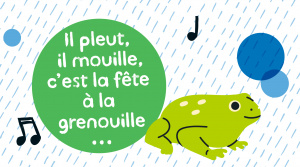Difference between revisions of "Language/French/Grammar/Impersonal-Verbs"
Jump to navigation
Jump to search
| Line 17: | Line 17: | ||
==Video - comptine pour enfants (nursery rhyme) : "Il pleut il mouille" == | ==Video - comptine pour enfants (nursery rhyme) : "Il pleut il mouille" == | ||
Children know how to use impersonal verbs like in this rhyme: "il pleut, il mouille, c'est la fête à la grenouille" (it's raining, it's wet, it's a frog party) | Children know how to use impersonal verbs like in this rhyme: "il pleut, il mouille, c'est la fête à la grenouille" (it's raining, it's wet, it's a frog party). 😄 | ||
<youtube>https://www.youtube.com/watch?v=kDdMLZEH45c</youtube> | <youtube>https://www.youtube.com/watch?v=kDdMLZEH45c</youtube> | ||
Revision as of 17:39, 2 December 2021
Personal and Impersonal Verbs
Impersonal verbs
Most verbs are personal: they must be conjugated to different persons, such as:
- Example: "manger" (to eat): je mange (I eat), tu manges (you eat), etc.
However, some verbs are used impersonaly, meaning they only have one conjugation, the third person singular.
- Example: we can say "Il pleut". However, we cannot say "Je pleus".
- See also the impersonal form.
Video - French Impersonal Verbs Examples : Valoir, Falloir, Pleuvoir
Video - comptine pour enfants (nursery rhyme) : "Il pleut il mouille"
Children know how to use impersonal verbs like in this rhyme: "il pleut, il mouille, c'est la fête à la grenouille" (it's raining, it's wet, it's a frog party). 😄

